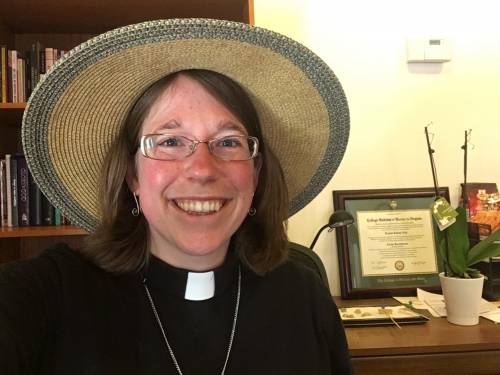We will practice boldly the things that make for peace
I Kings 21:1–16
Submitted by Rev. Ginna Bairby
Ahab said to Naboth, ‘Give me your vineyard so that I may have it for a vegetable garden,
because it is near my house’. . . But Naboth said to Ahab, ‘The Lord forbid
that I should give you my ancestral inheritance.’
Reflection: The story of Naboth’s vineyard may as well be a parable for our time. A farmer has a plot of land that has belonged to his family for generations. A powerful ruler wants to take this land, and the farmer says no. And so, the plans are laid, the troops are sent in, the farmer is removed from his land and killed, and the powerful ruler gets what he wants.
Have you heard this story recently? I feel like I have. I think of land grabs in Latin America. Or wars in the Middle East that seem thinly veiled efforts to keep a cheap oil supply. Or the murder and forced uprooting of indigenous peoples in this country . . . and the continued seizure of that land to build pipelines.
Again and again, Naboth is killed and his vineyard seized. Today it’s in the name of economic interests; tomorrow it might be for the sake of national security.
Of course, those of us who proclaim Jesus to be our Lord and Savior know that we are called to a different way of living. The Confession of 1967 states, “The church . . . is called to practice the forgiveness of enemies and to commend to the nations as practical politics the search for cooperation and peace . . . even at risk to national security.”
It seems to me that being a peacemaker means standing solidly on the side of Naboth. Again, and again, and again.
Action: Research the history of the land where you live today. To whom did it originally belong? If it no longer belongs to those people, how did that change take place?
Prayer: God of Justice, give us courage to speak truth to power and to pursue justice and peace, even when to do so goes against our national interests. Amen.
 Rev. Ginna Bairby is the pastor of First Presbyterian Church of Taos, New Mexico. Previously, she served for several years with the PC(USA)’s Compassion, Peace and Justice Ministries and as a Young Adult Volunteer in Lima, Peru. She is a graduate of the College of William Mary and Union Presbyterian Seminary and is the editor of the book Worldchanging 101 by David LaMotte.
Rev. Ginna Bairby is the pastor of First Presbyterian Church of Taos, New Mexico. Previously, she served for several years with the PC(USA)’s Compassion, Peace and Justice Ministries and as a Young Adult Volunteer in Lima, Peru. She is a graduate of the College of William Mary and Union Presbyterian Seminary and is the editor of the book Worldchanging 101 by David LaMotte.

This year’s Path of Peace reflections are based on the Five Affirmations to Guide the Peacemaking Witness of the Presbyterian Church (U.S.A.). Writers were recruited to help us explore the following affirmations as each week of A Season of Peace unfolds:
- Peacemaking is essential to our faith.
- We have sinned by participating in acts of violence.
- We reclaim the power of nonviolent love.
- We commit to the study and practice of nonviolence.
- We will practice boldly the things that make for peace.
Each author writes Monday–Friday, beginning with the first affirmation and ending with the fifth. The authors represent a variety of vocations and experiences in peacemaking efforts, and each week presents a new ‘voice’ to walk you through the affirmations. The weekend devotions, written by the editor, also reflect the five affirmations. Individuals and households are invited to make use of these daily reflections beginning on Sunday, September 3, and concluding on World Communion Sunday, October 1.